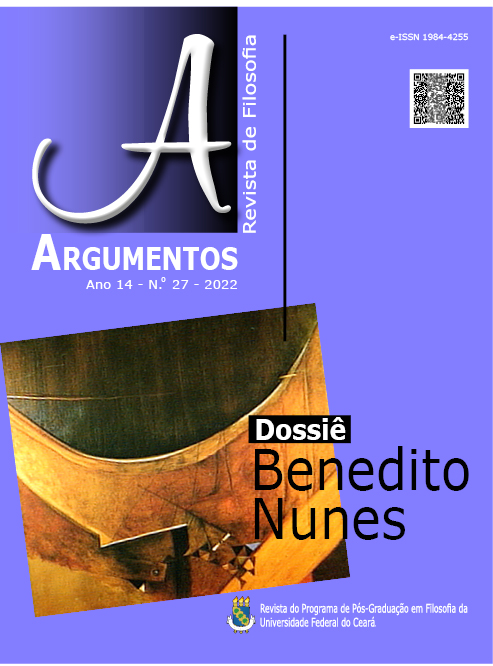What friends were doing: Hannah Arendt and philosophy
DOI:
https://doi.org/10.36517/Argumentos.27.12Keywords:
Hannah Arendt. Philosophy. Thinking. Judging. Forgiving.Abstract
The text presents an attempt to understand, within the framework of Hannah Arendt's thought, her refusal to be called a philosopher, and relates this circumstance to her experiences in Germany during Nazism and her intention to reflect on politics in a context in which tradicional responses are no longer able to provide guidance. Taking into account the relationship, identified by Arendt, between the absence of thought and evil, it investigates whether the faculty of judgment, released by thought, can be affected not only by thoughtlessness, but by the radicalization of the very conditions of thinking.
References
ARENDT, Hannah. A Condição Humana. Rio de Janeiro: Forense-Universitária, 1987.
ARENDT, Hannah. A crise na cultura: sua importância social e política. In: ARENDT, Hannah. Entre o Passado e o Futuro. 3ª ed. São Paulo: Perspectiva, 1992.
ARENDT, Hannah. Algumas questões de filosofia moral. In: ARENDT, Hannah. Responsabilidade e Julgamento. São Paulo: Companhia das Letras, 2004.
ARENDT, Hannah. A vida do espírito: o pensar, o querer, o julgar. 2ª ed. Rio de Janeiro: Relume Dumará, 1993a.
ARENDT, Hannah. Compreensão e política. In: ARENDT, Hannah. A dignidade da política: ensaios e conferências. Rio de Janeiro: Relume Dumará, 1993b.
ARENDT, Hannah. Eichmann in Jerusalem: a report on the banality of evil. New York: Penguin Books,1994.
ARENDT, Hannah. Heidegger, a raposa. In: ARENDT, Hannah. Compreender: formação, exílio e totalitarismo. Ensaios (1930-54). São Paulo: Companhia das Letras, 2008.
ARENDT, Hannah. Heidegger at Eighty. In: ARENDT, Hannah. Thinking without a banister: Essays in Understanding 1953-1975 (ebook). New York: Schocken Books, 2018.
ARENDT, Hannah. Lições sobre a filosofia política de Kant. Rio de Janeiro, Relume Dumará, 1993c.
ARENDT, Hannah. O grande jogo do mundo. In: ARENDT, Hannah. A dignidade da política: ensaios e conferências. Rio de Janeiro: Relume Dumará, 1993d.
ARENDT, Hannah. O interesse pela política no recente pensamento filosófico europeu. In: ARENDT, Hannah. A dignidade da política: ensaios e conferências. Rio de Janeiro: Relume Dumará, 1993e.
ARENDT, Hannah. On Hannah Arendt. In: HILL, Melvyn A. (Ed.). Hannah Arendt: The recovery of the Public World. New York: 1979.
ARENDT, Hannah. O que é filosofia da Existenz? In: ARENDT, Hannah. A dignidade da política: ensaios e conferências. Rio de Janeiro: Relume Dumará, 1993f.
ARENDT, Hannah. Organized guilt and universal responsibility. In: ARENDT, Hannah. The Jew as Pariah: Jewish identity and politics in modern age. New York: Grove Press, 1978.
ARENDT, Hannah. Origens do Totalitarismo. São Paulo, Companhia das Letras, 1989.
ARENDT, Hannah. Pensamento e considerações morais. In: ARENDT, Hannah. A dignidade da política: ensaios e conferências. Rio de Janeiro: Relume Dumará, 1993g.
ARENDT, Hannah. Só permanece a língua materna. In: ARENDT, Hannah. A dignidade da política: ensaios e conferências. Rio de Janeiro: Relume Dumará, 1993h.
ARENDT, Hannah. “What remains? The language remains”: a conversation with Günter Gaus. In: ARENDT, Hannah. The portable Hannah Arendt. New York: Penguin Books, 2000.
HINCHMANN, Lewis; HINCHMANN, Sandra. Existentialism Politicized. In: HINCHMANN, Lewis; HINCHMANN, Sandra (Ed.). Hannah Arendt: critical essays. New York: State University of New York Press, 1994.
KATEB, George. Hannah Arendt: politics, conscience, evil. New Jersey: Rowman & Allanheld, 1984.
JASPERS, Karl. Introdução ao pensamento filosófico. São Paulo: Cultrix, 1971.
SCOTT, Joanna Vecchiarelli; STARK, Judith Chelius. Rediscovering Hannah Arendt. In: ARENDT, Hannah. Love and Saint Augustine. Chicago: The University of Chicago Press, 1996.
VILLA, Dana R. The Banality of Philosophy: Arendt on Heidegger and Eichmann. In: MAY, Larry; KOHN, JEROME (Ed.). Hannah Arendt: twenty years later. Cambridge, Massachussets: The MIT Press, 1996.
Downloads
Published
Issue
Section
License
Argumentos magazine is licensed under an International Creative Commons Attribution License.
The Magazine uses CC BY inclusion
1) The authors retain the copyright granted to the magazine or the right to initial publication, with the work regularly licensed under the Creative Commons Attribution, which allows the sharing of the work with acknowledgment of authorship and initial publication in this magazine.
2) The authors are authorized to contract additional applicable contracts, for non-exclusive distribution of the version of the work published in this journal (for example, publication in the institutional repository or as a chapter of the book), recognition of authorship and initial publication in this journal.
3) Authors are authorized and encourage to publish and distribute their work online (for example, in institutional repositories or on their personal pages) at any time before or during the editorial process, as they can generate productive changes, as well as increase the impact and reference of published work.




.jpg)










._._3.png)
1.jpg)
._._._.png)
